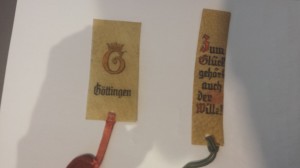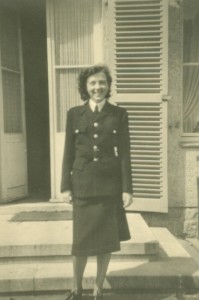Two weeks ago marked seventy years since the Nazis tried to exterminate the Jews. It saddens me that in a few years’ time there will no longer be any living survivors.
For thousands of years nations have risen up against the Jews, trying to destroy us. In the end, they disappeared while the Jews remained. That there is a single Jew walking this planet is one of the greatest miracles. May G-d continue to protect us bring the final redemption for all mankind speedily in our days.
Several months ago a women came to see me. She brought with her two book marks believed to be made of Jewish human skin. She was looking for audience what to do with them. Should they be buried in a Jewish cemetery? Should they go to a Jewish museum?
To cut a long story short, we are still researching the mater. I’ve shown the book marks to some art collectors who believe the skin is not human, rather it is pig skin. The book marks will need to undergo more testing to determine with certainty. If anyone has information that can help with this, please be in contact.
The following is a letter written by Mark about how the bookmarks came to into his mother’s possession:
Towards the end of the war, in late 1944 I believe, mum was working with the British War Department as an interpreter when she was recruited into a special unit that was working with the Red Cross and working with a unit called the Jewish Brigade. From what I know, she was eventually recruited to Control Commission, a body set up to sort out the displaced persons the allies knew were in their hundreds of thousands across Europe. The unit she worked in was headed by a Col Bowring and her job was to help set up a new records system to deal with an unknown number of displaced persons and those held in concentration camps. At that time she and her staff thought they were internment camps and nothing else.
The network of camps across Nazi controlled territory were mostly focussed on extermination rather than imprisonment although there had been plenty of evidence of murder, torture and disappearance on a massive scale which she later found was not made public.
As the allies entered Germany in 1945 my mother was assigned to work with the British troops that were entering North Germany. She inadvertently found herself with a team who were entering territory that was not being fought over. She told me that most of the Germans in the region knew the war was over so the fighting wasn’t really fierce at that time. Various units were dispatched to forward positions and the one she was attached to went to a camp called Bergen Belsen. Colonel Bowring, who was the head of the unit and my mother’s boss, had sent her with one of the forward units as she was fluent in German.
She told me that there was a column of vehicles and a couple of armoured vehicles and she was in one of those. She could smell the camp about a kilometre or so before they got there. She told me later that she was never able to get the smell of the place out of her nose. As they arrived, the forward soldiers were already through the gate and hundreds of very thin people poorly clothed were standing around or lying on the ground. My mother and the soldiers couldn’t believe what they had stumbled across. It was like walking into Hell.
My mother had to document who was there and worked with other soldiers in one of the buildings. She was told of the danger of typhus and to be careful. It seemed like a long time but within a few hours dozens of people arrived, army doctors, supply people with food and water and more people to help with the huge task of finding out who was there.
I cant remember how long she was there but I think it may have been a week or two as there were thousands of people liberated and it took a while to process them and find many missing persons. I recall she told me about the difficulty of recording people who were still dying and keeping track of those who were being sent to other places (I think other camps for displaced persons). The records at the camp were not good and it seemed that many had arrived at the camp from other places not long before the camp was liberated. She did tell me that there were some records with lots of photos of people, presumed deceased.
She gave me a fairly graphic description of the place and all the horrors that were there including bodies everywhere and stories of brutal guards who thought the inmates were expendable.
One of those who was liberated, told mum of some of the horrors that had been perpetrated on the inmates. They were starved, beaten and routinely shot for no reason. It left a deep impression on her. Among the many things that the occupying forces found amongst mountains of belongings and Nazi paraphernalia were a range of bizarre items that seemed normal but were the product of the horrors of a number of Nazi camps. These included a few items that the inmate told her were made of human skin. There were lampshades and book marks and other items. I don’t know exactly who gave the bookmarks to her but it was someone associated with Bergen Belsen camp and she told me they wanted to get rid of them. She had mixed emotions about them, wanting to bury them at some point, but eventually they remained in her cupboard with a lot of World War II material including Nazi items.
Bergen Belsen, or Belsen as It was commonly called, was a true horror camp and the sick mentality of those who ran it represented one of the lowest points in human history.
My mother spent another two years with Control Commission as the task of sorting out millions of displaced people was enormous and the units dealing with the problem were understaffed a lot of the time. She lived in various parts of Germany and for a time was based in Lemgo. Much of what she did she told me was secret and I never really delved too much into it. She seemed to think the Official Secrets Act was still in force!!
I still have her lapel badges and buttons and the Control Commission badge she wore as well as the CC magazines. I also have a photo album of the Control Commission people and I think some were attached to the Jewish Brigade like Mum. She met a Jewish man who she really loved whilst working there and she kept his photo, good looking guy. He asked mum to marry her and go to Palestine but at that time things were rough in Palestine and she was warned by her friends to keep away. So she returned to England in early 1947 I think, and later married Dad.
It seems odd but all these years later there are still bits of information or artifacts that take us back to that horrible time.
Anyway I hope that whatever happens they stand as a reminder of that time.
-Mark
Read More







